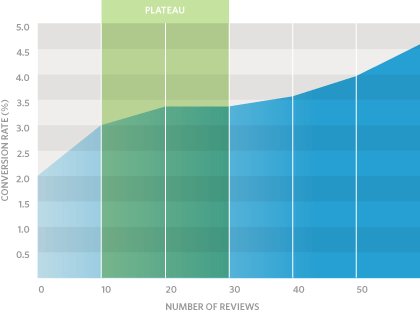Quantity vs. quality: you need both for online reviews

Aleš Randa
3 min
Reviews are about quantity as well as quality. The number of reviews directly increases conversions and sales. Content often determines whether a customer completes a purchase. Why is that?
Reviews increase brand trust, reach, sales and company morale. We talk about this every day on our blog. We're backed up by an ever-expanding field of research. However, the power of reviews depends heavily on what they are. And it's not just about positivity or the number of stars.
Why you should want a lot of reviews
A survey from Power Reviews showed that 99% of customers check the number of reviews. In an ideal world, they'd like to find at least 100 reviews, with 23 percent talking about 500 or more.
According to the research, the number of conversions increases with the volume of reviews. The effect is clearly summarized in a chart by smartinsights:

The largest increases occur when increasing from zero to 10 reviews. The interval of 10 to 30 reviews seemingly gives the illusion of a ceiling, with conversions rising only minimally here. However, after 30 the effect increases again, for example, a rise from 25 to 50 boosts conversions by 18%.
According to other studies, companies with a higher number of reviews have up to 54% greater sales than others. Plus, every five new reviews doubles the probability of a product sale.
Why is that?
A large number of reviews increases your reach, because Google uses them to a certain extent to determine your position in search engines. At the local business level, review characteristics make up to 15% of the selection process.
Psychology plays a big role. A higher volume of reviews gives credibility, 4/5 stars from thousands of people is a better rating than 5/5 from a few dozen. Statistically we would be talking about a representative sample (reviews are after all a survey of society).
Quality matters too, but it's not just about the number of stars
Every brand wants to have as many positive reviews as possible. Yet it's the negative ones that 82% of customers are looking for. They spend five times more time reading them on a product page. 95% will start to doubt its credibility if they don't find any negatives. For three quarters of buyers, negative reviews provide valuable insight into how a product works, which then influences the buying decision.
Not surprisingly, brands with 20% negative reviews have 13% more sales than those with 10%. Even bad reviews can sell.
What other qualities play a role in reviews?
- Authenticity. The customer must trust that the reviews are genuine. Thanks to the new decree, sellers have to actively verify the authenticity of their reviews.
- Objectivity. Reviews can be paid for, but customers can easily tell when a product is being praised artificially.
- Length and informativeness. It's not enough to just be short of super and awesome and recommend. People are looking for information. Is the vacuum cleaner quiet? Does the bed start to squeak? Does the protein really dissolve well? 96% of buyers doubt your ad. It's only in the reviews that they check to see if you're telling the truth.
%20-%20nov%C3%BD%20web-27.png)
%20-%20nov%C3%BD%20web-26.png)

